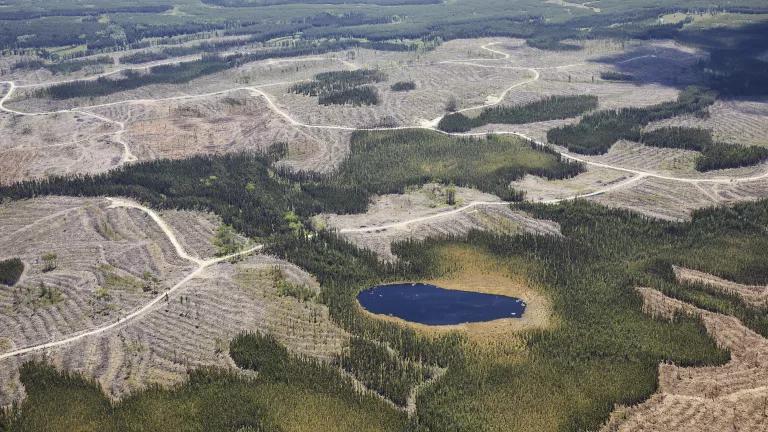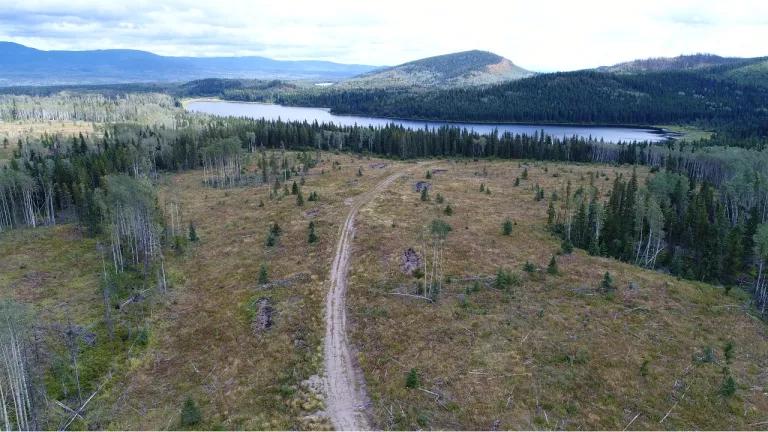2020: The Year to Super Charge Our Work on Nature
This year’s World Wildlife Day, with the theme of Sustaining All Life on Earth, heralds a year where we must commit to transformative change to stop what will otherwise be a devastating crash in our natural systems. On World Wildlife Day 2020, we know that in working to sustain all life on Earth, we sustain ourselves.

Tree stumps in an area cleared by slash and burn agriculture
Dudarev Mikhail/Shutterstock
This year’s World Wildlife Day, with the theme of Sustaining All Life on Earth, heralds a year where we must commit to transformative change to stop what will otherwise be a devastating crash in our natural systems. Business as usual is failing our natural systems and our own wellbeing. Our health, food, communities, livelihoods and security depend on healthy and diverse ecosystems around the globe and the biodiversity they support. On World Wildlife Day 2020, we know that in working to sustain all life on Earth, we sustain ourselves.
Just under a year ago, the United Nations released its troubling report about a natural world in critical risk. That is why the UN has named 2020 a biodiversity “super year,” recognizing the international opportunities to chart a better course for global biodiversity and ecosystems.
NRDC and our allies throughout the conservation community will be demanding a commitment to progress. That progress must include a tangible path for protecting at least 30 percent of the world’s ocean and 30 percent of the world’s lands, including freshwater ecosystems, by 2030 (“30 by 30”). It must limit deforestation, eliminating the destruction of intact forest landscapes that are not only important biodiversity hotspots, but also critical to curbing climate change. And it must severely limit trade in wild plants and animals, especially those that are threatened with extinction, so we can strengthen and enhance populations that will face other threats in the years ahead.
The story of species decline has been unfolding for decades and has advanced in recent years beyond the traditional spotlight on individual species. Unless we change the way we impact and use natural resources, we are looking at a horrific loss with as many as one million species threatened with extinction. This means more than 500,000 terrestrial species are dead species walking, with insufficient habitat for long term survival without habitat restoration. It also means massive declines in the populations of mammals, birds, fish, reptiles, amphibians, and insects.
So, we’ve got to get this right. It’s time to get more ambitious than we’ve ever been and demand the kind of change scientists tell us is necessary to secure a vibrant future for the planet and ourselves: a fundamental, system-wide reorganization across technological, economic, and social factors. And let’s be honest about what this transformative change means. Does it mean we won’t be able to produce food like we have been for the past 40 years? Yes. Does it mean we won’t be able to cut down trees, mine for gold, and dam rivers like we have been? Yes. Does it mean we won’t be able to take animals and plants out of the wild and traffic them around the world like we have been? Yes.
However, it also means greater food security, protections against climate change, cleaner air and water, and access to nature for our children. Protecting wildlife and natural systems is an existential issue for humans. We cannot survive without healthy natural systems to sustain us. 2020 is the biodiversity super year because of the decisions that can be taken at key international gatherings throughout the year. NRDC is going to be at all of them, fighting for the ambitious decisions and commitments we need to secure the best future for the natural systems that sustain us.
- The thirteenth Conference of the Parties to the Convention on Migratory Species (CMS COP13) took place from February 17 to 22 in India. The conference set in motion actions needed to better protect migratory species that need aggressive multilateral cooperation to survive. My colleague was there and has written about the important progress made.
- This summer, two important meetings taking place in Europe: the 2020 UN Ocean Conference from June 2 to 6 in Lisbon, Portugal, and the IUCN World Conservation Congress (IUCN WCC) from June 11 to 19 in Marseille, France. At the UN Ocean Conference, NRDC will be advancing an array of ocean issues, like protecting marine and coastal ecosystems, minimizing ocean acidification, eliminating illegal and over-fishing, and advancing international protections to the High Seas. These efforts will advance the cause of life below water and will promote healthy and thriving marine biodiversity. NRDC will be at the IUCN WCC to secure support for and vote on numerous motions setting forth the position of the most influential coalition of conservationists in the world. Among other things, the Congress will be calling for policy solutions for some of the most pressing biodiversity challenges, like halting the destruction of our forests, transitioning to healthy farming practices, and compelling fisheries to operate in a way that enhances marine biodiversity.
- In September, NRDC will be at the United Nations’ Nature Summit, calling on leaders to be ambitious in using their power to facilitate the transformational changes needed to achieve the UN’s 2050 Vision for Biodiversity: by 2050, biodiversity is valued, conserved, restored and wisely used, maintaining ecosystem services, sustaining a healthy planet and delivering benefits essential for all people.
- The focus on biodiversity culminates with the fifteenth Conference of the Parties to the Convention on Biological Diversity (CBD COP15), which will chart a course for international and domestic action over the next decade to halt precipitous decline of the planet’s biodiversity. The theme of CBD COP15 is, “Ecological Civilization: Building a Shared Future for All Life on Earth,” which is fitting given our predicament. NRDC is participating in the process that’s developing that course—the Post-2020 Global Biodiversity Framework—which will be adopted at CBD COP15. It remains to be seen if the level of ambition in the Framework will be commensurate with the crisis we face, but NRDC and others are working to support a bold and aggressive path forward, like a strong commitment to 30 by 30.
- The year ends with the Glasgow Climate Change Conference (COP26), taking place from November 9-19 in the United Kingdom. One of the five key themes of the conference will be nature-based solutions to climate change, recognizing the indispensable role of nature protection in ensuring a safer climate as well as building resilience to the impacts of climate change.
The calendar is busy, but we must capitalize on all these key moments in 2020 to start locking in decisions and mechanisms that will help secure biodiversity and a healthier planet. At NRDC, on World Wildlife Day 2020 and throughout this biodiversity super year, we’re rolling up our sleeves and working harder than ever to sustain life on Earth.



